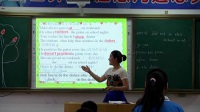視頻簡介:

視頻標(biāo)簽:Don’t eat,in class
所屬欄目:初中英語優(yōu)質(zhì)課視頻
視頻課題:七年級下冊Unit 4 Don’t eat in class. Section B 1a—1d老河口
教學(xué)設(shè)計、課堂實錄及教案:七年級下冊Unit 4 Don’t eat in class. Section B 1a—1d老河口市第三中學(xué)
教學(xué)目標(biāo)
(1) Knowledge aims
①New words: out, practice, dish , before
②Key phrases: go out, practice the guitar, do the dishes, before dinner
③Important sentences: Can Dave...? Yes,he can./No, he can’t.
Does Dave have to ...? Yes, he does./ No, he can’t.
(2) Ability aims
The students are able to talk about rules with modal verbs have to, must.
(3) Emotional aims
Nothing can be accomplished without norms or standards, encourage students to follow the rules, tell them not to break the rules,
in this way,we can build a harmonious society.
2學(xué)情分析
3重點(diǎn)難點(diǎn)
(1) Important points: learn to talk about the rules
(2)Difficult points: talk about rules with modal verbs have to, must
4教學(xué)過程
4.1第一學(xué)時
4.1.1教學(xué)活動
活動1【導(dǎo)入】Step1 Preparation
(1) Divide the students into six groups, they will have a competition among the groups. If they work well, they will win a prize for their
group.
(2) Ask the students to talk about the school rules with their partner, then let some students tell us what they can’t do and what they
have to do at school.
(3) Review the library rules together.
活動2【講授】Step2 Presentation
(1)Show three pictures and talk about the rules that my son has at home
a picture one, the teacher ask ”Can he go out on school nights?””When can he go out?”, teach the new word”out” and the key
phrase “go out”, read the important sentences “He can’t go out on school nights, he can go out on weekends.” in different ways,
boys read and girls read.
b picture two, the teacher ask “What must he practice every day?””When must he practice the piano?”, teach the new words ”
practice””before” and the key phrases “practice the piano””before dinner”, read the important sentence ”He must practice the
piano before dinner.” in different ways, team one read, team two read and team three read.
c picture three, the teacher ask “What is he doing?””What does he have to do?”, teach “dish””do the dishes”, ask oneteam to read
“He has to do the dishes after dinner” one by one.
(2)Let the students give a report about the rules in my family, if they do well, give them some hands.
活動3【練習(xí)】Step 3 Practice
(1)The teacher give an example first:
a ask one student ”Can you watch TV on school nights?”, then ask the other students ”Can he watch TV on school nights?”
b ask one student “Do you have to clean the room every Saturday?”, then ask the other students “Does he have to clean the room every Saturday?”
(2)Let the students talk about their family rules with their partner, they can talk about the pictures, they also can talk about other
things.
(3)Ask some groups to show their conversations to us, if they do a good job, clap for them.
活動4【活動】Step 4 Production
1. Finish 1a, ask the students to read the rules in 1b, then match the rules with the rules with the picture from a to h, then check the
answers.
2. Finish1b and 1c
(1) listen and put an “X” for things Dave can’t do.
(2) listen and put a “√”for Dave has to do
(3) Scan the phrases in the box, then listen when Dave has to follow the rules in the chart in 1b.
(4) Make a report about Dave’s family rules.
3. Work in group of four to do a survey
(1) ask their friends “What can’t they do at home””What do they have to do at home”, put an “X” and a “√”;
(2) Write a short passage about their friends’ family rules
(2) Give a report about their friends’ family rules.
活動5【測試】Step 5 Progress
Finally, it’s time to do some exercises, in this way, the students can have a deep memory about What they have learned in this
class. This step can help students to summarize what they have learned.
一、根據(jù)句意和首字母完成單詞:
1. Mike always goes o_______ on weekends.
2. He often p______ the guitar on school nights.
3. Tom washes his hands b______ dinner.
4. The students often help their mothers do the d______
二 句型轉(zhuǎn)換
1.He practices the guitar every day.(改為否定句)
He _____ _____ the guitar every day .
2. She can go out on weekends. (一般疑問句)
_____ she_____ out on weekends? .
3. I have to do the dishes .(劃線提問)
______ _____ you _____ _____ ____?.
4.Jack has to do the dishes after dinner.(一般疑問句)
_____ Jack_____ _____ do the dishes after dinner?
三 翻譯句子
1 他必須每天練習(xí)拉小提琴。(practice)
_____________________________________________
2 在上學(xué)日的晚上,我們必須在十點(diǎn)以前睡覺。(before)
__________________________________
3 Dave 能在上學(xué)日出去見朋友嗎?不,他不能。(can)
_____________________________ ,_______________
4她必須在晚飯后洗碗嗎? 是的。(have to)
____________________________________,
活動6【作業(yè)】Step 6 Homework
Living in the society, rules are very important to us, “Nothing can be accomplished without norms or standards”, as for
homework,I let the students point out their classmates’ improper behavior, I think just start from the little things, we can build a
harmonious society.
視頻來源:優(yōu)質(zhì)課網(wǎng) www.jjlqy.cn
| -----更多視頻請在本頁面頂部搜索欄輸入“Don’t eat,in class”其中的單個詞或詞組,搜索以字?jǐn)?shù)為3-6之間的關(guān)鍵詞為宜,切記!注意不要輸入“科目或年級等文字”。本視頻標(biāo)題為“七年級下冊Unit 4 Don’t eat in class. Section B 1a—1d老河口”,所屬分類為“初中英語優(yōu)質(zhì)課視頻”,如果喜歡或者認(rèn)為本視頻“七年級下冊Unit 4 Don’t eat in class. Section B 1a—1d老河口”很給力,您可以一鍵點(diǎn)擊視頻下方的百度分享按鈕,以分享給更多的人觀看。優(yōu)質(zhì)課網(wǎng) 的成長和發(fā)展,離不開您的支持,感謝您的關(guān)注和支持!有問題請【點(diǎn)此聯(lián)系客服QQ:983228566】 ----- |
